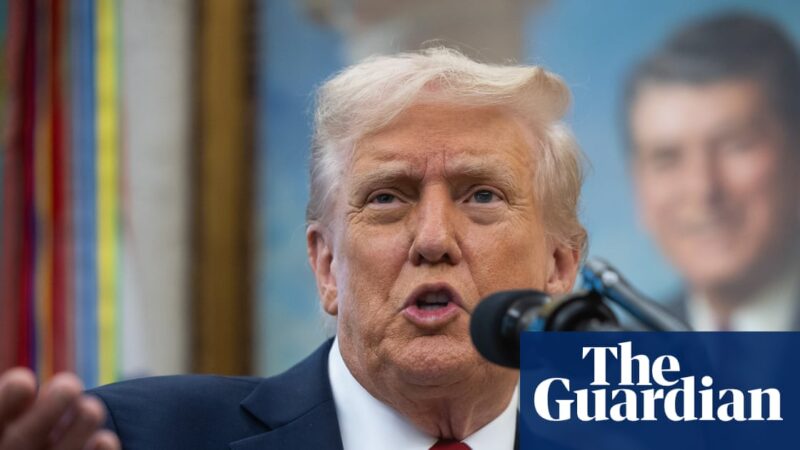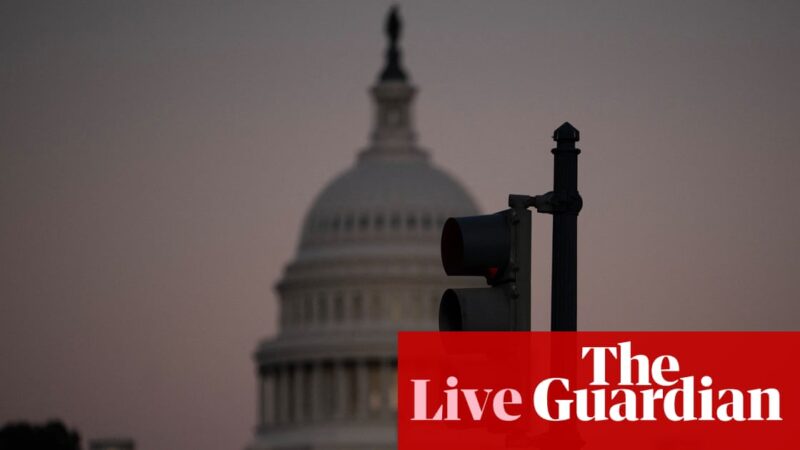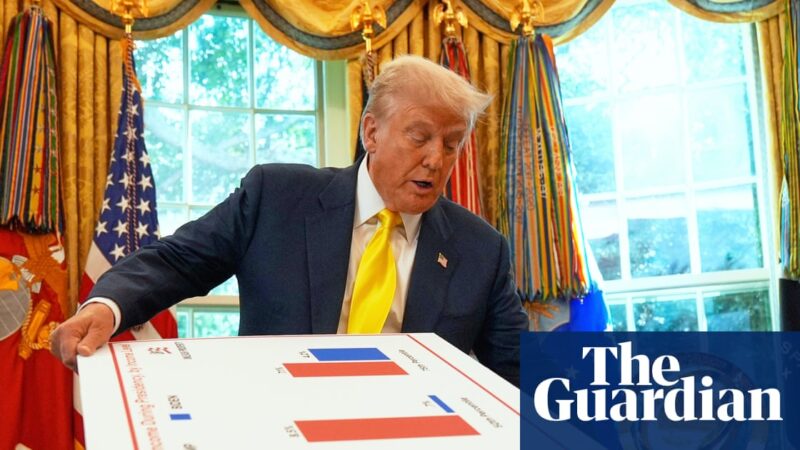European markets largely shrug off Trump tariffs on pharmaceuticals, trucks and kitchen cabinets – business live | Business
Key events
UK ‘pressing for better outcome on US pharma tariffs’
The UK government says it is pressing the United States on pharmaceutical tariffs in hope of a beneficial outcome, after President Donald Trump said a new 100% tariff would apply to firms unless they build a manufacturing presence in the country.
A British government spokesperson says (via Reuters):
“We know this will be concerning for industry, which is why we’ve been actively engaging with the U.S. and will continue to do so over the coming days,”
“Sectors such as pharmaceuticals are critical to our economy… so we will continue to press the U.S. for outcomes that reflect the strength of our relationship and deliver real benefits for UK industry.”
Pharma tariff threat creates uncertainty across Europe

Lisa O’Carroll
Donald Trump’s overnight threat to impose 100% tariffs on pharmaceuticals from companies not based in the US has been met with fresh uncertainty across Europe.
The Germans and the EU-wide trade body have expressed concern while Ireland and Brussels says it remains confident that the 15% tariff rate agreed in July will apply to European drugs exported to the US.
The threat also brings fresh threats to exports from the UK, which is still waiting to seal a deal delivering Trump’s pledge to give it “preferential treatment” promised as far back as 8 May, could be snared by any new tariffs.
The European Federation of Pharmaceutical Industries and Associations said “urgent discussions” were needed to clarify Trump’s intentions reiterating its position that tariffs on medicines could “increase costs, disrupt supply chains and prevent patients from getting life saving treatments”.
Nathalie Moll, Director General, EFPIA said:
“The EU and US already have a trade agreement in place; urgent discussions are needed on how to avoid any tariffs on medicines that harm patients in the EU and the US.”
Germany’s VFA trade association said on Friday the US deal could hit Germany-based pharmaceutical businesses hard and would violate previous transatlantic trade agreements. Around 25% of Germany pharma exports go to the US, worth about €27bn in 2024, it added.
Ireland and Germany are two of the three EU countries with surplus trading relationships with the US and both large pharma industries.
Ireland’s deputy prime minister Simon Harris said it would be “studying the impact” of the announcement but stressed that the joint statement on 21 August about the EU US tariff deal “made absolutely clear that any new tariffs announced by the US on pharmaceuticals under its Section 232 investigation would be capped at 15% for pharma products being exported by the EU.”
EU trade spokesperson Olof Gill confirmed this was also the view in Brussels: “ This clear all-inclusive 15% tariff ceiling for EU exports represents an insurance policy that no higher tariffs will emerge for European economic operators”.
The new tariff threat comes just days after the US also opened a section 232 investigation into medical devices that can include anything from stents for the heart to prosthetic hips, X-ray machines and pacemakers.
Ireland’s trade minister has insisted that the agreement that US tariffs on EU pharmaceuticals would be capped at 15% remains the case, after Donald Trump’s announcement of higher tariffs on the sector.
Simon Harris said in a statement:
“I want to stress that the EU and US joint statement issued on August 21 made absolutely clear that any new tariffs announced by the US on pharmaceuticals would be capped at 15% for pharma products being exported by the EU.”
“This remains the case and underlines again the value of the agreement reached last month,” he said, adding that Dublin and other EU member states would study the impact of Trump’s announcement.
European markets largely shrug off Trump tariffs
Eurpopean stock markets are largely shrugging off the impact of Donald Trump’s latest tariffs, although truck makers have been jolted.
The main European indices are all ending the week with gains. London’s FTSE 100 index is up 0.4% or 37 points at 9250, with Germany’s DAX up 0.5% and France’s CAC share index rising 0.8%.
Neil Wilson, UK investor strategist at Saxo, says stocks are shrugging off the noise around tariffs, telling clients:
The tariff news ought to add to the bearish narrative we’ve seen take hold in equity markets this week, but so far European equity markets are rising and US futures are a bit higher.
Maybe [due to] weaker euro/sterling, maybe just tariff noise can be ignored?
Truck manufacturers, though, are suffering from the prospect of a 25% tariff on their goods. Daimler Truck are now down 2.4%, while Munich-based Traton Group have lost 2.8%.
European pharmaceuticals stocks have shrugged off their earlier weakness.
There seem to be two reasons.
-
The EU-US trade deal caps pharma tariffs at 15%, so they should avoid the new 100% tariff announced last night
-
Companies who have begun building manufacturing in the US are exempt from the new tariffs – and there’s already been plenty of investment recently from, for example, Roche and AstraZeneca as mentioned earlier.
Switzerland’s Roche has pointed out that one of its US units recently broke ground on a new facility.
A Roche spokesperson has told Reuters that its Genentech unit announced plans for a facility in Holly Springs, North Carolina, on 25 August.
Roche has also made a $50bn pledge to invest in U.S. manufacturing and research and development.
This could indicate that Roche will be protected from the new pharmaceuticals tariffs, as they won’t apply to companies building U.S. plants. Shares in Roche are up 0.2%.
Switzerland says its government departments are analysing the potential impact of pharmaceutical tariff measures announced by US president Donald Trump overnight.
The Swiss economy ministry said in a statement that the relevant departments are analysing the impact of the measures together with the relevant stakeholders.
It noted that it did not have details of the measures announced (not an ususual situation when it comes to Trump’s trade war pronouncements…)
AstraZeneca has quickly shrugged off those early losses.
Its shares are only down 0.09% now. Perhaps traders have clocked that its US expansion plans mean it could avoid Trump’s new pharma tariffs….
Truck maker shares hit by tariffs
Shares in some European truckmakers have fallen in early trading, after Donald Trump announced a 25% tariff on imports of all heavy-duty trucks.
Daimler Trucks, the major commercial vehicle manufacturer, has dropped by around 4%.
The Traton Group, whose brands include Scania, MAN, International, and Volkswagen Truck & Bus, are down 2.1%.
Neil Shearing, group chief economist at Capital Economics, says Mexico could be most affected by the new tariffs:
The US sources 78% of heavy truck imports from Mexico and 15% from Canada, so a key question is whether there will be exemptions for USMCA-compliant products.
This is unclear at present, but it’s worth noting that most product-specific tariffs (with the exception of auto parts) have not had USMCA exemptions. If there’s no USMCA exemption, then Mexico will be most heavily affected by the large truck tariffs.
UK pharma stocks drop
Shares in UK pharmaceuticals giant AstraZeneca have dropped by 1.4% at the start of trading in London.
AstraZeneca are the biggest faller on the FTSE 100 share index.
That’s a slight surprise (to me, anyway), as AstraZeneca recently announced it will invest $50bn (£37bn) in the US by 2030. That ought to satisfy Trump’s position that taxes could be avoided by companies if they built manufacturing plants in America.
Kathleen Brooks, research director at XTB, explains:
UK Pharma giant AstraZeneca could be better placed than some of its European rivals, due to promised extra investment in the US that has already been announced, and the President’s promise to treat the UK differently when it comes to pharma tariffs.
Thus, the FTSE 100 could be a relative ‘safe haven’ in the middle of this latest tariff storm.
Shares in fellow pharma firm GSK are close behind, -0.9%.
The overall FTSE 100 is flat in early trading.
As tariffs are paid by importers, not exporters, Trump’s new levies could sharply push up the cost of some medicines for Americans.
Pascal Chan, vice-president for strategic policy and supply chains at the Canadian Chamber of Commerce, warned that the tariffs could harm Americans’ health with “immediate price hikes, strained insurance systems, hospital shortages, and the real risk of patients rationing or foregoing essential medicines”.
“We are already being crushed by the highest prescription drug costs in the world and this will cause them to skyrocket further,” 314 Action, a US advocacy group that tries to elect scientists to office, said in a statement.
“If [Trump] goes through with these tariffs, people across the country will die.”
More here:
Introduction: Trump rattles markets with new tariffs on pharmaceuticals, trucks and kitchen cabinets
Good morning, and welcome to our rolling coverage of business, the financial markets and the world economy.
Donald Trump has opened up a new front in his global trade wars, jolting investors.
Overnight, the US president announced tariffs of 100% on medicines and pharmaceutical goods imported into the US, dropping a shoe that had been dangling over the pharma industry for months.
In a wide-ranging move, Trump also announced 25% tariff on imports of all heavy-duty trucks, 50% tariffs on kitchen cabinets, a 50% tariff on bathroom vanities and a 30% tariff on upholstered furniture, with all the new duties taking effect from 1 October.
The tariffs announced by Trump do not apply to generic pharmaceuticals, and companies will be exempt if they have begun constructing new manufacturing facilities in the US.
Trump claimed the taxes on imported kitchen cabinets and sofas were needed “for National Security and other reasons”.
He said the new heavy-duty truck tariffs were to protect manufacturers from “unfair outside competition” and said the move would benefit companies such as Paccar-owned Peterbilt and Kenworth and Daimler Truck-owned Freightliner.
He added:
“We need our Truckers to be financially healthy and strong, for many reasons, but above all else, for National Security purposes!”.
The announcement has given investors “a fresh reminder about the trade war, and the impact has already been evident in Asian markets,” reports Jim Reid, market strategist at Deutsche Bank.
Shares in Asia-Pacific companies with exposure to the US market have dropped today – Japan’s Sumitomo Pharma are down 4.6%, and Austalia’s biotechnology firm CSL have lost almost 2%.
Shares in Europe’s biggest pharma companies are also set to fall when trading begins; Novo Nordisk, Roche, Novartis and Astrazeneca are down betweeen 1.8% and 2% on the Tradegate platform, Reuters reports.
That’s despite the EU agreeing a trade deal with the US which appears to limit tariffs on pharma and semiconductor exports to 15%, in line with most other sectors in the trade deal.
The crackdown on kitchen cabinets has hit stocks too; an index tracking Chinese-listed furniture makers has dropped around 1%.
New US inflation data, due this afternoon, will show whether the trade war is pushing up the cost of living for Americans.





